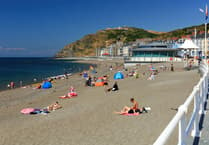A call to extend a west Wales cemetery to provide a space for eco-friendly natural burials has been refused by planners.
A natural burial is an eco-friendly alternative to traditional burial, burying a body in the ground without a coffin or headstone.
In an application to Pembrokeshire County Council, the Trustees of Tabernacle Chapel sought permission for a change of use of agricultural land to extend the existing Tabernacle Cemetery, Fishguard to include a natural burial site.
A supporting statement, through agent Gethin Beynon, said the land has been in the cemetery ownership since 1945, adding: “Based on the development forming a similar use to the adjacent cemetery and being in the same ownership as the Trustees of Tabernacle Chapel, the proposal would be classed as an extension to an existing community facility.
“As the development is not proposing any engineering or physical features with the natural habitat being retained, it is considered the change of use of the land would be in keeping in an area where other cemeteries exist to the north, east and west of the application site.”
It added: “With regard to the operation of the burial ground, when a burial takes place, a plot is allocated, and the turf cut and set aside. The topsoil and subsoil are then heaped alongside the grave. The graves would be dug to the appropriate depth to earth over the coffin to protect it whilst allowing the body to recycle in the active/living layer of the soil.
“After a burial, soil is returned in compacted layers around and on top of the coffin, with topsoil and turf on top. Grave locations are plotted and recorded on plan. It is intended that such administration and management duties of the site would be undertaken by the applicants.
“Due to the development not resulting in marked graves and there being no maintenance requirements from mourners, visits and any associated vehicle movements would be of a low intensity and infrequent.”
The application was supported by Fishguard and Goodwick Town Council, subject to satisfactory outcomes of an archaeological survey in relation to nearby Castell Mwrtach, an Iron Age defended enclosure and possible associated earthworks, along with discussions with the south Wales Trunk Road Agency.
An officer report, recommending refusal, said Natural Resources Wales (NRW) had raised concerns “that cemeteries have the potential to cause pollution to controlled waters, with the level of risk dependent on many factors and to fully assess potential impact of each site an initial Tier 1 assessment which shall define potential pathways and receptors in proximity of the site,” adding: “No such risk assessment has been submitted in support of this application resulting in a development that does not adequately confirm the level of risk to controlled waters the development poses.”
Archaeological advisors Heneb has said a geophysics survey of the site is needed to determine any effect on adjacent to Castell Mwrtach.
“As a geophysics survey has not been submitted in support of the application, it cannot be demonstrated that the development would have an acceptable impact on the historic environment in conflict [with policy].”
The scheme was refused by planning officers on the grounds of the concerns raised.




